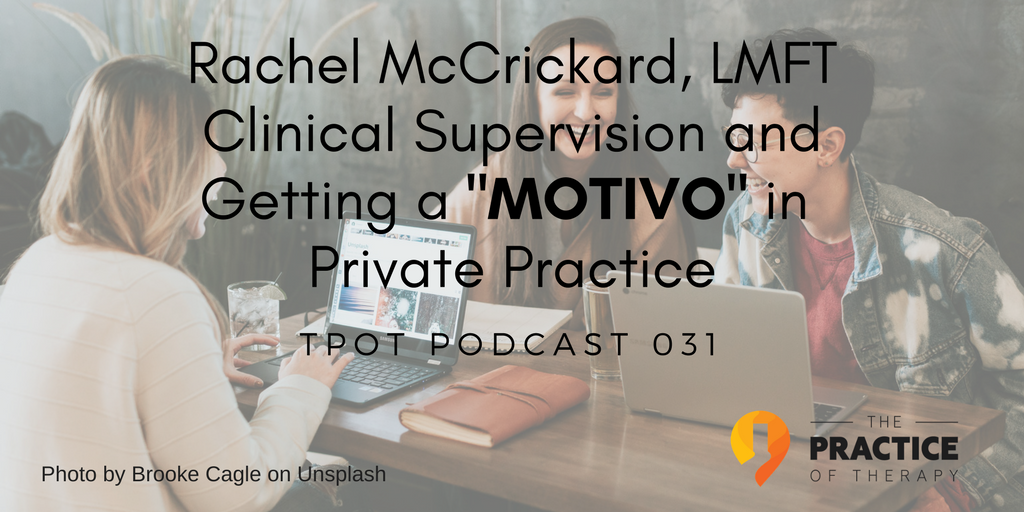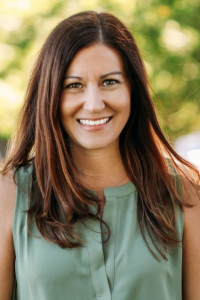
In this episode of the Practice of Therapy Podcast, Gordon talks with Rachel McCrickard, LMFT about clinical supervision and her new venture, Motivo. Motivo helps solve the problem clinicians have around finding supervisors that are a good fit for them in their development and movement toward licensure. One the problems many people run into, especially in rural areas, is being able to have access to clinical supervision. They discuss the changes that have occurred with the licensure in many states, and the ability to meet with clinical supervisors via video conferencing. Motivo helps pair pre-licensed clinicians with the clinical supervisors they really want to work with.
Meet Rachel McCrickard, LMFT
 Rachel McCrickard, Founder/CEO of Motivo, is a Licensed Marriage and Family Therapist with extensive experience in the mental health care industry. A graduate of Azusa Pacific University, Rachel spent the early years of her career providing therapy to homeless individuals in Los Angeles, CA. In 2011, Rachel returned to her hometown of Chattanooga, TN where she began providing therapy to rural and underserved areas at a large mental health agency. Rachel began to recognize the difficulty many therapists experiences when attempting to find quality clinical supervision in rural areas. Impassioned by her inherent entrepreneurial spirit, Rachel fostered the creation of Motivo in 2017 and is now providing therapists with an easier path to licensure through online supervision.
Rachel McCrickard, Founder/CEO of Motivo, is a Licensed Marriage and Family Therapist with extensive experience in the mental health care industry. A graduate of Azusa Pacific University, Rachel spent the early years of her career providing therapy to homeless individuals in Los Angeles, CA. In 2011, Rachel returned to her hometown of Chattanooga, TN where she began providing therapy to rural and underserved areas at a large mental health agency. Rachel began to recognize the difficulty many therapists experiences when attempting to find quality clinical supervision in rural areas. Impassioned by her inherent entrepreneurial spirit, Rachel fostered the creation of Motivo in 2017 and is now providing therapists with an easier path to licensure through online supervision.
Finding the Right Fit
Much of the clinical supervision process mirrors what we do in therapy with our clients. It is so important to find the right “fit” with a clinical supervisor. After all, you will be spending a great deal of time and making a significant financial commitment to move through the licensure process. Having a healthy relationship with the person who is supervising you is so critical for your development as a clinician.
One dilemma is being supervised by someone with a different theoretical or clinical background from the clinician’s training. For example, an MFT with training in systems theory working with someone using a more individually focused model.
Motivo Solving the Problem
When Rachel moved from California back to Tennessee she began working on forming Motivo out of a need she saw with many of her fellow clinicians. She was working for an agency and saw the struggle of many pre-licensed people having a hard time finding people to supervise them.
Not only was it difficult for people to find clinical supervisors, the time and money commitment was prohibitive because of the distances people were having to travel to meet with supervisors. The solution was two-fold; using video conferencing and having a directory of clinical supervisors that could provide supervision.
Motivo is a Portuguese word that means “foundation”. The whole idea behind Motivo is helping clinicians make the best of their training years and developing a good foundation for their clinical work.
Accessibility and Reasonable Rates
When Rachel formed Motivo, it was with the idea of making clinical supervision not only accessible but affordable as well. Currently, they are in need of people to be supervisors. For supervisors, it is free to join. Apply at wearemotivo.com
For people seeking a supervisor, the rates are very reasonable with a maximum individual rate of $60 per hour, $50 per hours for dyads and $40 per hour for groups. They also have the opportunity to interview as many potential supervisors at no cost.
Diversifying Income
For clinicians that are already licensed, offering supervision is a great way to diversify income and create other streams of income. In particular, if you are able to have supervision groups that help maximize your time. It’s a win/win proposition in that you are creating other income for yourself and helping newer clinicians with their licensure process.
Taking Risks and “Making the Jump”
Another thing that Rachel and Gordon discussed was how Rachel had been working for an agency and decided to take the leap and go out on her own. Even though Rachel did not go specifically into private practice, she was able to do something “outside the box” but in a related field.
The key was that Rachel took the time to learn about being an entrepreneur and identified a need for other clinicians. Rachel talked about looking into business resources within your community to learn more about running a small business. For example, Chambers of Commerce and other business incubators that are out there.
Finally, Rachel and Gordon talk about how it is so important to seek out mentors and coaches to help us in our journey. If you think about it, it is no different than what our clients do with us as clinicians when they come to us with their problems. We all need guidance and mentors in our lives. It is the whole premise behind clinical supervision. Why not do the same with your business practices?
Resources Mentioned:
Rachel’s Website: WeAreMotivo.com
Meet Gordon Brewer, MEd, LMFT
Gordon is the person behind The Practice of Therapy Podcast & Blog.He is also President and Founder of Kingsport Counseling Associates, PLLC. He is a therapist, consultant, business mentor, trainer, and writer. PLEASE Subscribe to The Practice of Therapy Podcast on iTunes, Stitcher and Google Play. Follow us on Twitter @therapistlearn and Pinterest “Like” us on Facebook.

